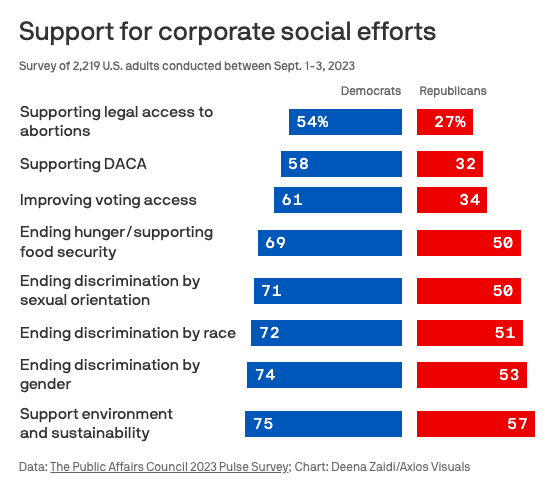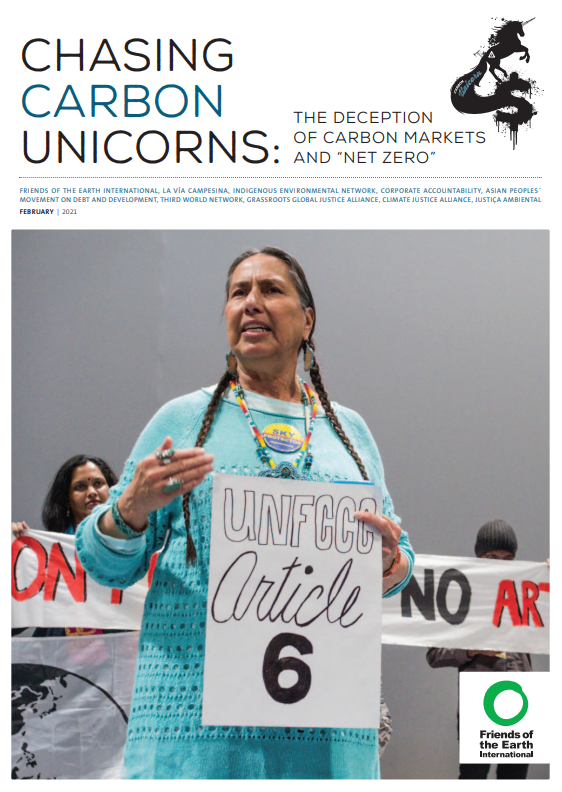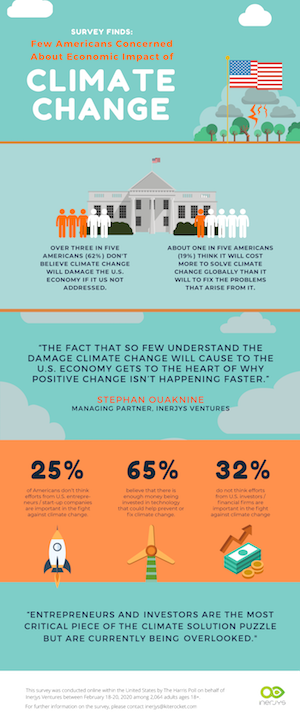Resources
Search below for resources covering the intersection of climate engagement, social science and data analytics.
RESULTS
Poll: Support declines for Corporate America's political involvement
Most Americans say that major companies should be involved in environmental advocacy. 93% of Americans say that major companies should support improving environment and sustainability practices. 61% of Americans say that major companies should be involved in advocacy about improving environmental and sustainability practices, including 75% of Democrats and 57% of Republicans.
This report examines the availability of EVs being sold at car dealerships and the barriers to consumers who are in the market for an EV. Key findings include:
From divergence to convergence: Examining the energy transition expectations of oil and gas executives and investors
Amid a growing focus on net-zero, a recent Deloitte survey compares the expectations of oil and gas (O&G) executives and institutional investors around the energy transition. O&G companies cite a 28% average reduction in emissions over the last three years and remain confident about achieving a 50%–60% reduction in emissions by 2030. Additionally, there is a recognition that the O&G industry offers high dividend and buyback yield to investors, leading all industries with a combined yield of 8% in 2022. Although their paths toward net-zero might not be completely aligned, there seems to be a shared consensus between executives and investors on the industry’s potential to achieve its overarching goal.
Time to Put the Fossil-Fuel Industry Into Hospice
If humanity is to survive the climate crisis, we must manage a just and orderly transition away from fossil fuels. Acknowledge the full scope of the problem. Recognize the limited scope of economic policy solutions. Accept that substantially reducing greenhouse-gas emissions presents an existential challenge for the industry. We face the challenge of managing “compassionate destruction,” in which we guide all the complex and expansive elements of the fossil-fuel sector through a just and orderly transition to a carbon-free economy. Bring about the end of the entire sector through corporate collaboration. Protect workers and avoid labor flight during transition. Overcome political and social resistance to change. Account for the full scope of the financial impact of the transition. Control the fate of products both used and unused. Protect indirect workers in related industries. Maintain justice and equity for all communities. Decommission, remediate, and repurpose dedicated infrastructure. Leverage the power of government. Overhaul business education as if people and the planet really matter.
Poll: Americans Want to See Greater Transparency on ESG Issues and View Federal Requirements as a Key Lever for Increasing Disclosure
Americans overwhelmingly support mandatory corporate disclosures of climate data and agree that companies have a responsibility to reduce their environmental impacts. 94% of Americans (including 90% of Republicans) say that it’s at least “somewhat” important for America’s largest companies to be transparent about their environmental impact. 88% of Americans (including 81% of Republicans) say that America’s largest companies have at least “some” responsibility to reduce their environmental impact by using sustainable materials and renewable energy. 87% of Americans (including 77% of Republicans) say that it’s at least “somewhat” important for America’s largest companies to publicly report data about their climate impacts. 86% of Americans (including 74% of Republicans) support the federal government requiring large companies to publicly report climate data.
Chasing Carbon Unicorns: The Deception of Carbon Markets and “Net Zero”
What is “net zero”? Are the consequences for “net zero” the same for everyone? Friends of the Earth International’s 2021 report argues that the net zero commitments by multinational corporations and governments are “smokescreens” that hide these entities’ inaction. Instead, we should be aiming for actual reductions in the amount of carbon emission we are creating — a “real zero.” Instead of making real changes, the “net zero” plans will lead to carbon offset markets. These carbon offset markets then will likely require that large areas of land in the Global South be dedicated to offsetting carbon. This will effectively ignore the needs of local communities, whose autonomy over their land will likely be challenged – with indigenous communities being particularly vulnerable. Outsourcing carbon emissions to the Global South is not how we should combat climate change. “Real zero” is the real goal.
Poll: Few Americans Believe the U.S. Economy Will Be Impacted by Climate Change
Most Americans are underestimating both the potential economic impact of climate change and the role that entrepreneurs and investors can play in rectifying it, according to Inerjys Ventures, a global climate solutions investment firm:
- Fewer than two in five Americans (38%) believe climate change will damage the U.S. economy if it is not addressed.
- About one in five Americans (19%) think it will cost more to solve climate change globally than it will to fix the problems that arise from it.
- A quarter (25%) of Americans don’t think efforts from U.S. entrepreneurs/start-up companies are important in the fight against climate change.
- Only about a third of Americans (35%) believe there is not enough money being invested in technology that could help prevent or fix climate change.
- 42% say the U.S. government has more of a responsibility than U.S. companies to address issues in America that cause climate change.
Poll: Global consumers seek companies that care about environmental issues
68% of North Americans are "extremely” or “very concerned” about water pollution and 61% are "extremely” or “very concerned” about air pollution. Subsequently, 69% of North Americans consider it "extremely" or "very important" that companies implement programs to improve the environment. Across the global, concern is highest among Millennials (21-34), with 85% considering it “extremely” or “very” important that companies implement programs to improve the environment.




